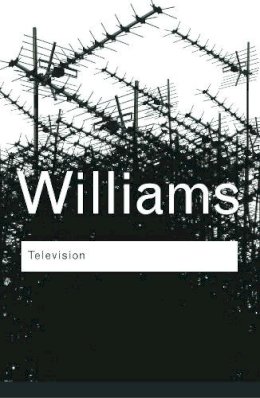
Stock image for illustration purposes only - book cover, edition or condition may vary.
Television: Technology and Cultural Form
Raymond Williams
€ 19.99
€ 19.67
FREE Delivery in Ireland
Description for Television: Technology and Cultural Form
Paperback. This text was first published in 1974, long before the dawn of multi-channel TV, or the reality and celebrity shows that now pack the schedules. Yet Williams' analysis of television's history, its institutions, programmes and practices, and its future prospects, remains prescient. Series: Routledge Classics. Num Pages: 192 pages, 3 black & white tables. BIC Classification: JFD. Category: (P) Professional & Vocational; (U) Tertiary Education (US: College). Dimension: 197 x 129 x 15. Weight in Grams: 208.
Television: Technology and Cultural Form was first published in 1974, long before the dawn of multi-channel TV, or the reality and celebrity shows that now pack the schedules. Yet Williams' analysis of television's history, its institutions, programmes and practices, and its future prospects, remains remarkably prescient.
Williams stresses the importance of technology in shaping the cultural form of television, while always resisting the determinism of McLuhan's dictum that 'the medium is the message'. If the medium really is the message, Williams asks, what is left for us to do or say? Williams argues that, on the contrary, we ... Read more
Product Details
Publisher
Taylor & Francis Ltd United Kingdom
Number of pages
192
Format
Paperback
Publication date
2003
Series
Routledge Classics
Condition
New
Weight
210g
Number of Pages
192
Place of Publication
London, United Kingdom
ISBN
9780415314565
SKU
V9780415314565
Shipping Time
Usually ships in 4 to 8 working days
Ref
99-4
About Raymond Williams
Raymond Williams (1921-1988). British cultural thinker and sociologist Raymond Williams is best known for pioneering the study of popular culture and the media, as well as for being one of the founding fathers of the British cultural studies group.
Reviews for Television: Technology and Cultural Form
'Television: Technology and Cultural Form is a powerful and original book which marked the beginning of a new breed of British accounts of television. Instead of focusing solely on the content of television programs, it examined the shaping effect of television's technological structures upon its characteristic forms.' - Graeme Turner, Centre for Critical and Cultural Studies, University of Queensland, Australia ... Read more
